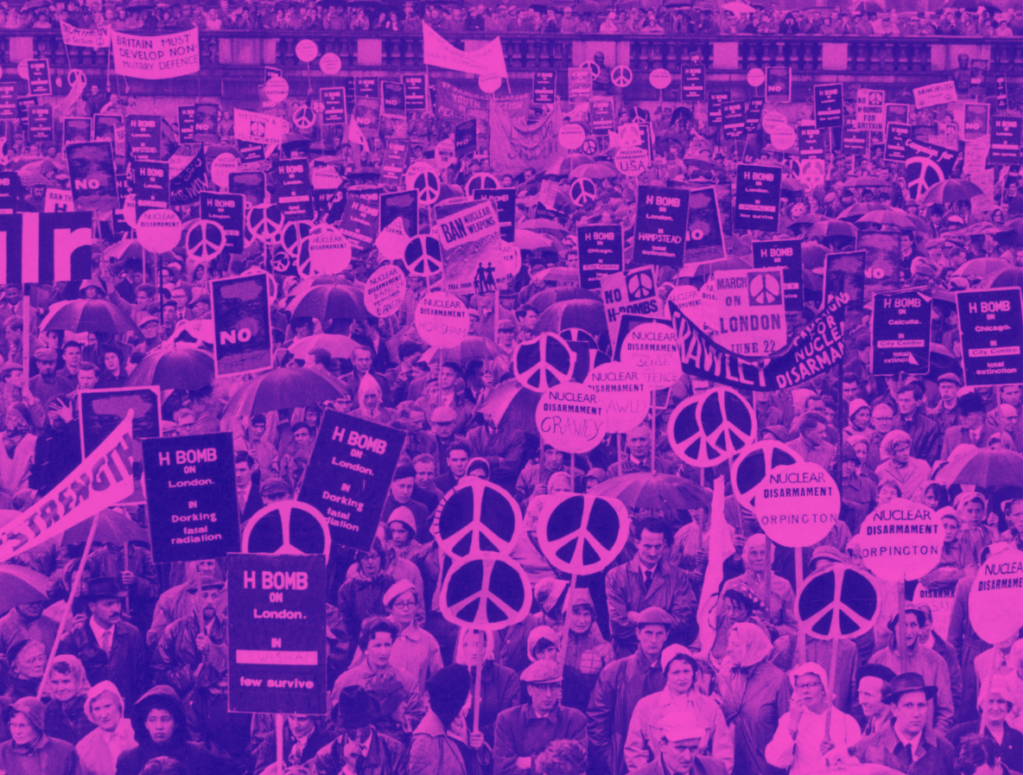As I write this the Russian assault against Ukraine continues. On the most basic level, the horrific images and stories coming from this war-torn nation must serve as a reminder of how important it is to have a strong antiwar movement in this country and on a global scale. The sad truth is that we do not. I appreciate the ongoing work of antiwar groups, and I understand the challenges they face, but an honest assessment should lead us all to the obvious conclusion that we are far from having a powerful movement against war and militarism.
Ethan Young’s article “Internationalism in the 21st Century” prompts us—particularly those of us who live in the United States—to think about our role as Leftists. There is a complex set of issues that we do not consistently pay attention to, let alone actively engage with. For example, in times of military interventions and wars the Left has always played a critical role in building an antiwar presence. But the ability to keep those movements dynamic and effective more often than not has waned once the worst of the war was over. And now, as the nightmare of the war in Ukraine rolls on, with a very real potential to expand in Europe, we need to focus in on what it means to be internationalists. While war and intervention are not the only issues on an internationalist’s agenda, they must be central to it.
The war in Ukraine is a striking example of what happens when militarism is at its full force. As internationalists in the United States, we are confronted with some hard questions: Is there a way to offer an analysis of why this war is happening that could be useful for preventing other such military engagements? Is there a way to bring our opposition to the Russian military assault and our opposition to U.S./NATO militarism into the public discourse? Are there concrete ways we can show our solidarity with the people of Ukraine, as well as with the people in Russia who are speaking out against what their government is doing?
While these and other questions are being addressed in some academic and activist arenas, getting to deeper and practical answers demands greater collective attention and study. By making connections with the left-democratic movements Young speaks about, we will be better positioned to offer solidarity—but those connections need to be made long before crises erupt. A strong antiwar movement, especially one grounded in internationalism, would also help us find those answers and connections.
Militarism pervades our history—and everyday life
Militarism is “glorification of war-making,” as Young says. It is also a lot more. It’s the constant framing of everything as a war—the War on Drugs, the War on Poverty, etc.—coupled with an utter disregard for almost all life, anywhere on Earth. It shows up everywhere in popular culture: toy guns and soldiers, blockbusters movies, video games and more. We see it in the transfer of military weapons, vehicles, and other equipment to local police forces around the country, making them even more militarized than they already were.
Militarism is one of the core elements of the DNA of this country. From the genocide against the Indigenous peoples of this land to the brutality used to enforce slavery, this nation was built by overpowering and killing people with sheer military force.
Anchoring it all is the pouring of massive amounts of money into the Pentagon every single year, with the nearly $800 billion in this coming federal budget, surpassing all previous budgets.
A serious campaign to dramatically cut the Pentagon’s budget might be one of the largest and most important acts of international solidarity we could undertake. Any cut would make a major difference, but it’s time to go big. Losing billions of dollars, the Pentagon would have to scramble and figure out budget cuts. This would open the opportunity for a deep and public look at spending in that vast domain of the United States Armed Forces. How much money has been going into equipment, munitions, tanks, fighter planes, submarines, uniforms, food, nuclear weapons, new generations of missiles, etc.? If done well, a campaign demanding major cuts in military spending would directly address what role the U.S. military plays in every corner of the world, and at the same time it could further reveal the relationships between the military and major corporations––the military-industrial complex first named by Dwight D. Eisenhower.
Staying focused on specific struggles around the world will always be important. There needs to be steady pressure on Washington (and wherever else it needs to be applied) to at least not make local or regional dynamics worse. Ideally, we should be demanding deep changes so that our foreign policy is grounded in a commitment to international law, respect for the sovereignty of all nations, serving the needs of people over the drive of profit, and more. US policy so often misses opportunities to promote peace and diffuse conflicts; the simmering conflicts between Ukraine and Russia could have been dealt with differently. A broader vision of peace and security in Europe might have led us to a better resolution before it came to this.
We should be demanding deep changes so that our foreign policy is grounded in a commitment to international law, respect for the sovereignty of all nations, serving the needs of people over the drive of profit, and more.
As we hone our understanding of foreign policy, we need to accurately account for the role of the vast US intelligence network. Young makes an important point about the changes in the CIA and other agencies. But we should not forget or understate how massive and multi-tactical the operations of the CIA, NSA, Defense Intelligence Agency, National Geospatial-Intelligence Agency, the intelligence operations within the FBI, Drug Enforcement Agency, each of the five military branches and other intelligence outfits actually are. They might make a lot of mistakes, but I don’t believe that we fully understand how powerful they still are in terms of events around the world and right here at home. Even though it’s often hard to get details of what they are doing, we run the risk of missing a critical link in U.S. global operations if we don’t pay attention to the work of the intelligence community.
The war in Ukraine has re-awakened attention to the very real dangers of nuclear weapons and nuclear power. A strong internationalist antiwar movement must demand the complete abolition of all nuclear weapons, period.
Having said all of this, there is the question of who the “we” is I keep referring to. Without a doubt the groups and people currently anchoring the antiwar movement in this country are part of that “we,” but unless and until there is a significant expansion of that movement—both in numbers and in the range of constituencies and communities actively engaged—the work will continue to fall short. There’s lots more to say about this, but space doesn’t allow further elaboration here.
To end militarism, we must end dependence on fossil fuels
A strong internationalism must more seriously engage in the global need to transition off of a fossil fuel energy economy and into a regenerative energy economy that is not based in extraction, exploitation, and oppression. Wars for oil, the vast amount of fossil fuels the U.S. military uses every day, and much more have fed the quickly worsening climate crisis. There is excellent work taking place in frontline communities around the globe. What is now needed is a much stronger connection between those efforts and the grounding of all of that in international solidarity and a truly global movement. Linking a bold climate justice movement with a strong antiwar and anti-militarism movement would make them both stronger.
Did you enjoy this article?
We're in the middle of our annual fund drive, and this year we're building our own internal infrastructure for subscriptions, meaning more of every dollar pledged goes to fulfilling our mission. Subscribe today to support our work and be a part of Convergence's next evolution.

